On Feb. 15, a
Senate panel in Florida voted to slash the state’s tipped hourly
minimum wage by more than half, from $4.65 to $2.13. This will have a
devastating effect on hard-working Floridians.
Charles Spencer, a
waiter in Downtown Disney who is working his way through school, told
the Orlando Sentinel that his current wage barely allows him to
survive. He added that he “was rather appalled by the fact they’re
going to try to cut a wage standard in this economy.” (Feb. 16)
The Florida
Restaurant and Lodging Association proposed the bill, arguing that
the wages of tip earners are not needed by employees because they
make so much in tips. This could not be further from the truth. The
current wages earned by many of Florida’s tip earners barely allow
them to afford basic health services. Michael Coberly, a valet
parking attendant and diabetic, told the Orlando Sentinel, “If you
cut my hourly wage in half, I wouldn’t have enough to pay for my
health insurance.” (Feb. 16)
The Florida
Restaurant and Lodging Association also argues that these wages are
crippling restaurants in Florida and their ability to sustain
employment. The National Employment Law Project, however, points to
the Restaurant Association’s projection last year that Florida (and
Texas) will experience the nation’s most robust restaurant job growth
in the coming decade. Participating in this growth is Tampa-based OSI
Restaurant Partners—owners of Outback Steakhouse and Carrabba’s
Italian Grill—which have tirelessly lobbied for the passage of the
draconian wage cut.
Restaurants like
Outback Steakhouse want this bill passed so they can boost profits,
not to protect the jobs of restaurant workers. Capitalist economists
and pundits are unapologetic in declaring that within a capitalist
economy businesses exist to make profits and not to provide jobs or a
living wage. Why then do we continue to put up with this system?
This situation
highlights the need for massive collective action, which can come in
the form of taking to the streets or organizing in our workplaces.
Either way, the 99 percent must organize for political and economic
justice. In the class war, the 1 percent has its politicians and
legislatures, but we have each other.






